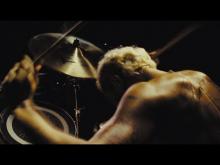November 13, 2023 - 11:06


The abruptness of the last scene really stuck with me. I was glad that Ruben finally came to terms with his deafness: just sitting there in silence, he finds stillness, or as Joe says, the "kingdom of god." His life seems to be filled with so much more light, quiet, and opportunity than the dark, chaotic, and explosive intro concert scene. Afterward, I hope that Ruben returns to the deaf community and teaches the school kids drums. It would be like a full circle of rediscovering himself as a deaf musician, rather than going on tour and pretending nothing had happened. Though he has lost that past life, I think his new journey is better. He finds the will to go on in himself, rather than being codependent with Lou. I can imagine this movie not only being instructive on deaf culture, but also a good lesson in processing change and finding contendedness in life. Sometimes, less is more.

Comments
Sound of Metal
Submitted by peacefulpuzzler on November 13, 2023 - 16:35 Permalink
This contrast between the last scene and the rest of the movie was also what stood out to me the most. Ruben had spent every moment since starting to become deaf waiting for when he could get the "miracle cure" of a cochlear implant that would allow him to hear again and restore his life back to normal. Yes, he learned sign language and was even able to find some moments of happiness interacting with the kids, but throughout these scenes, he never truly embraced Deaf culture, as shown by his decision to sell his drums and RV (the two things he cared most about, other than Lou) in order to get the implant. However, in this last scene as he takes off the cochlear implant and allows himself to truly exist in silence, he finally realizes that this "dream" of restoring everything to the way it was is not actually how he wants to live.
Although in some ways I felt frustrated during the movie at his refusal to accept his deafness until the last scene (following the idea of deafness as a negative thing), I think that this struggle against deafness is what makes the movie so powerful for viewers, especially those who have not experienced deafness or disability themselves. Of course, the movie depicts many positive aspects of deafness/Deaf culture as well, but by leaving room for (and even emphasizing) this initial struggle and rejection of disability, the movie pushes away the narrative of the disabled inspiration and allows us to see Ruben as simply human, coming to terms with a new, uncertain situation the same way that many of us would. Through this, we are able to gain a greater understanding of Deaf culture and the nuanced experience of being deaf and/or Deaf that the common narratives of disability in our society often ignore.